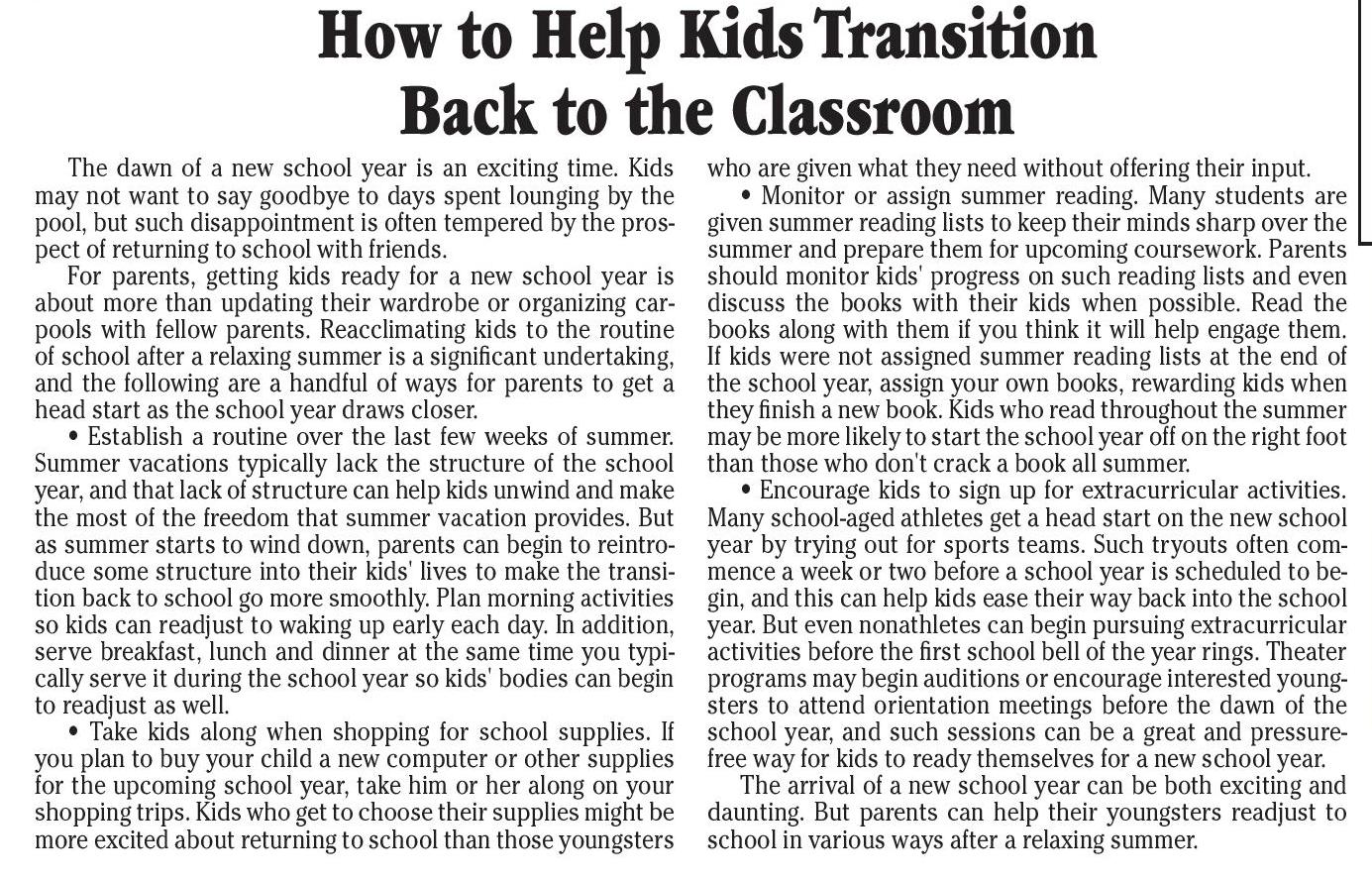10





10 Broadcaster Press
August 2, 2016 www.broadcasteronline.com
How to Help Students Choose an Extracurricular Activity
7 Ways to Make
Mornings Less Hectic
Make school and work mornings less harried with
some easy tips to add to routines.
Extracurricular activities can benefit students in various ways. Academic clubs, sports and volunteer organizations provide
students with opportunities to grow as people and make new friends while also teaching kids skills they will use for the rest of
their lives.
Many parents are aware that extracurricular activities can help students improve their chances of gaining admission to college. But students who choose the right extracurricular activities will benefit in greater ways than simply strengthening their
college applications. The following are a handful of ways parents can help their sons and daughters choose extracurricular
activities they can benefit from for years to come.
• Ask kids to jot down their interests. Students are more likely to enjoy and excel at extracurricular activities that align with
their existing interests. Ask kids to jot down a list of their interests or anything they might want to try. Youngsters might want
to learn a musical instrument even if they have never before taken a course on music. Once kids have listed their interests, look
for activities that allow them to further explore those interests. Chances are there is a school-sponsored or community-based
club or organization that will align with at least one thing on your child’s list.
• Encourage kids to have fun. Kids are more likely to enjoy and fully commit to an activity if they find it fun. While extracurricular activities can help kids grow as people and improve their image in the eyes of college admissions officers, kids will get
even more out of an activity if they enjoy doing it.
• Look for something that won’t interfere with schoolwork. Extracurricular activities can look great on a college application,
but that benefit is lost if the activity interferes with a student’s academic performance. Some activities, including sports, demand more of students’ time than others, but make sure kids know that school always comes first.
• Ask around. Ask neighbors or school officials for recommendations to help kids who have tried but failed to find the right
fit with regard to extracurricular activities. Sometimes it takes a little trial and error before a child finds an activity he or she is
comfortable with. Fellow parents can make great resources, and school officials likely know of a host of clubs and organizations
that kids may be interested in.
• Sign up with your kids. If kids are hesitant to sign up for an activity because they are shy, sign up with them. Volunteer
organizations are typically family-friendly, and kids might be more likely to come out of their shells if they sign up with their
parents or siblings. As kids grow more comfortable with an activity, they will want to get more involved even if mom and dad
don’t have the time.
Parents can employ various strategies to help kids find activities they can be passionate about for years to come.
How to Help Kids Transition
Back to the Classroom
The dawn of a new school year is an exciting time. Kids
may not want to say goodbye to days spent lounging by the
pool, but such disappointment is often tempered by the prospect of returning to school with friends.
For parents, getting kids ready for a new school year is
about more than updating their wardrobe or organizing carpools with fellow parents. Reacclimating kids to the routine
of school after a relaxing summer is a significant undertaking,
and the following are a handful of ways for parents to get a
head start as the school year draws closer.
• Establish a routine over the last few weeks of summer.
Summer vacations typically lack the structure of the school
year, and that lack of structure can help kids unwind and make
the most of the freedom that summer vacation provides. But
as summer starts to wind down, parents can begin to reintroduce some structure into their kids' lives to make the transition back to school go more smoothly. Plan morning activities
so kids can readjust to waking up early each day. In addition,
serve breakfast, lunch and dinner at the same time you typically serve it during the school year so kids' bodies can begin
to readjust as well.
• Take kids along when shopping for school supplies. If
you plan to buy your child a new computer or other supplies
for the upcoming school year, take him or her along on your
shopping trips. Kids who get to choose their supplies might be
more excited about returning to school than those youngsters
C
on
ve
ni
en
ce
who are given what they need without offering their input.
• Monitor or assign summer reading. Many students are
given summer reading lists to keep their minds sharp over the
summer and prepare them for upcoming coursework. Parents
should monitor kids' progress on such reading lists and even
discuss the books with their kids when possible. Read the
books along with them if you think it will help engage them.
If kids were not assigned summer reading lists at the end of
the school year, assign your own books, rewarding kids when
they finish a new book. Kids who read throughout the summer
may be more likely to start the school year off on the right foot
than those who don't crack a book all summer.
• Encourage kids to sign up for extracurricular activities.
Many school-aged athletes get a head start on the new school
year by trying out for sports teams. Such tryouts often commence a week or two before a school year is scheduled to begin, and this can help kids ease their way back into the school
year. But even nonathletes can begin pursuing extracurricular
activities before the first school bell of the year rings. Theater
programs may begin auditions or encourage interested youngsters to attend orientation meetings before the dawn of the
school year, and such sessions can be a great and pressurefree way for kids to ready themselves for a new school year.
The arrival of a new school year can be both exciting and
daunting. But parents can help their youngsters readjust to
school in various ways after a relaxing summer.
r!
o
rb
ck
a
@
ou
y
do
/7
4
2
Corner of W. Cherry & Stanford • 605.624.8050
Many families find the rush is on to make it to school and
work on time each morning. Feeling rushed in the morning is
a recipe for added stress. Rushing through things is a poor
way to begin a day, and those feelings of uneasiness can put a
damper on the rest of the day ahead.
Making mornings less hectic involves a few different
strategies that parents and kids can easily incorporate into
their daily routines.
• Wake up slightly earlier. Getting up earlier than normal,
even if it’s just 15 to 20 minutes before you’re accustomed to
getting out of bed, can help reduce morning stress. Resist the
temptation to hit the snooze button over and over again. A few
extra minutes each morning can make you feel more relaxed
and make for a smooth, stress-free start to the day.
• Get some work done the night before. Prepare lunches
the night before and have them ready in the refrigerator. In
addition, lay your clothes for the following day out each
night. This saves time and takes a couple more things off your
morning to-do list.
• Ease back into a routine. As a new school year dawns or a
long vacation comes to an end, begin going to bed earlier and
start waking up earlier as well. This can make the transition
from carefree mornings to busy mornings go more smoothly.
• Prep backpacks in the evening. Look through folders,
sign paperwork, check assignments, and do whatever is you
need to do the night before to save your family from having to
scramble in the morning. This ensures those permission slips
get signed and items make it back into school bags.
• Opt for school lunch a few times. Look ahead on the school
lunch menu and speak with children about which meals they
enjoy. Let kids purchase school lunch on those days to give
yourself a day off from lunch detail.
• Have quick breakfast foods available. Smoothies, cereal
bars, oatmeal, and whole-grain cereals are fast and nutritious
ways to start the day.
• Carpool whenever possible. Busy families can save
themselves extra work by proposing a neighborhood carpool.
Sharing school dropoff detail frees time up for parents once
or twice a week, and kids may enjoy traveling to school with
their friends.
Mornings can be tricky when family members are getting
ready for school and work at the same time. By practicing a
few daily rituals, it’s possible to curb the rush and start the
day happier and more relaxed.
As a new school year draws nearer, parents can
employ several strategies to help their kids
readjust to the rigors of the classroom.
Fall Registration
Preschool through 5th grade is on
Wednesday, August 10th
4:30 - 7:00 p.m.
General Assembly at 5:30 p.m.
Registration will take place in the classrooms & new addition.
Please come, even if you are pre-registered.
Call if you are unable to attend.
Classes Begin: Wednesday August 17th, 2016
at 8:20 a.m.
Contact:
St. Agnes School
909 Lewis Street
Vermillion, SD 57069
605.624.4144




















 Previous Page
Previous Page






